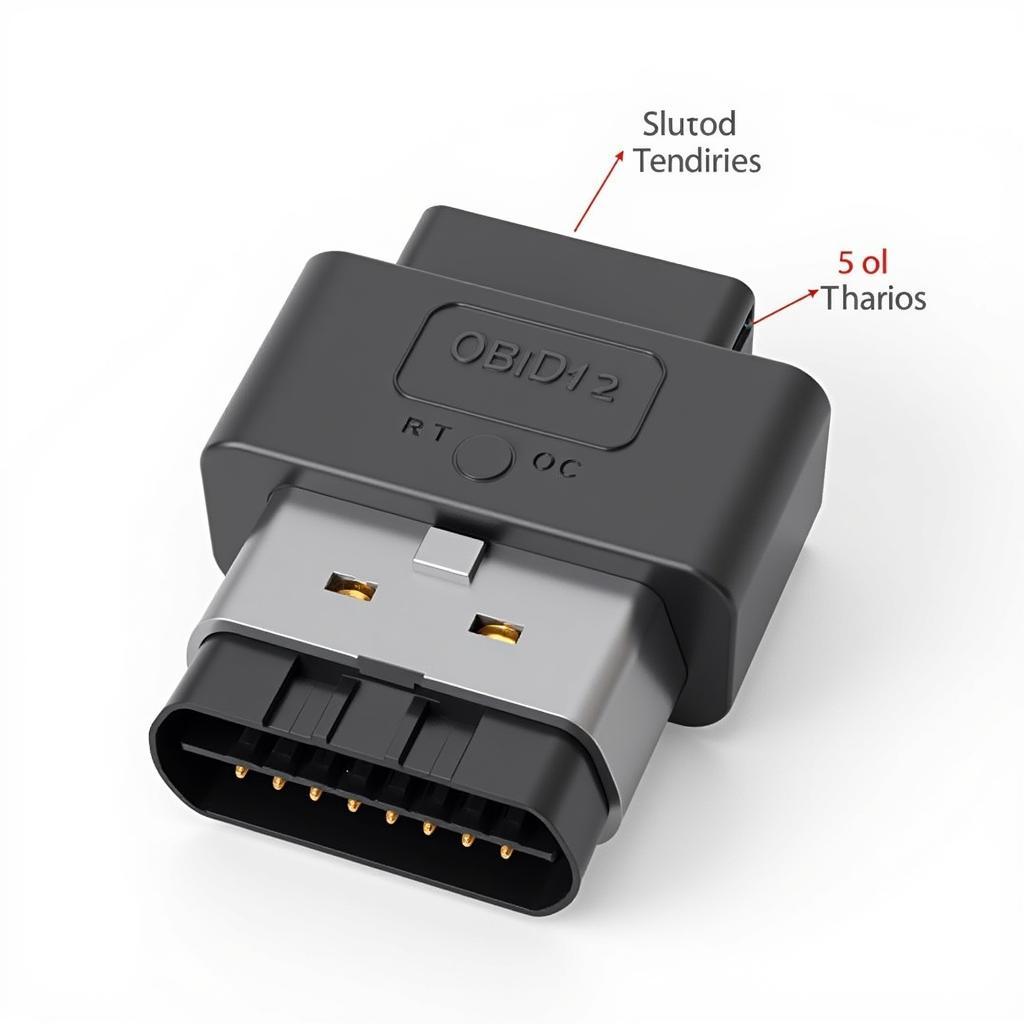Owning a Volkswagen comes with the satisfaction of driving a reliable and well-engineered vehicle. However, like any other car, Volkswagens can experience issues. Understanding where to find the OBD2 port location on your Volkswagen is crucial for diagnosing and resolving these issues. This article serves as your ultimate guide to locating and utilizing the OBD2 port on your Volkswagen.
What is an OBD2 Port and What Does it Do?
The OBD2 port, short for On-Board Diagnostics port, is a standardized 16-pin connector found in all gasoline vehicles manufactured after 1996 and diesel vehicles manufactured after 2008. This port serves as the access point for the vehicle’s onboard computer, allowing mechanics and car owners to:
- Retrieve Diagnostic Trouble Codes (DTCs): These codes are triggered when the car’s computer detects a malfunction within its systems.
- Monitor Real-time Engine Parameters: Access live data streams from various sensors, providing insights into engine performance, fuel efficiency, and more.
- Perform Emissions Tests: Ensure your Volkswagen complies with environmental regulations.
Locating the OBD2 Port in Your Volkswagen
In most Volkswagen models, the OBD2 port is typically located within the driver’s side footwell, beneath the dashboard. However, the exact location might slightly vary depending on the model year and region. Here’s a more specific breakdown:
- Under the Steering Wheel: This is the most common location across various Volkswagen models, including Golf, Jetta, Passat, and Tiguan.
- Behind a Panel or Cover: Some models may conceal the port behind a removable panel or a small access cover for aesthetic reasons.
- Fuse Box: In certain older Volkswagen models, the OBD2 port might be situated inside the fuse box, usually located under the dashboard or on the side of the dashboard.
If you’re having trouble finding the OBD2 port in your Volkswagen, consulting your owner’s manual is always recommended. The manual will have a dedicated section that visually pinpoints the port’s location within your specific Volkswagen model.
Common Uses of the OBD2 Port in Volkswagens
- Diagnosing Engine Problems: When the “Check Engine” light illuminates on your dashboard, an OBD2 scanner can retrieve the stored trouble codes, providing valuable information about the underlying issue.
- Resetting Warning Lights: After addressing a problem, you can use an OBD2 scanner to clear the corresponding warning lights on your dashboard.
- Monitoring Performance Data: Track real-time data such as engine speed, coolant temperature, and oxygen sensor readings to assess engine health and efficiency.
Choosing the Right OBD2 Scanner for Your Volkswagen
The market offers a wide range of OBD2 scanners, each with varying functionalities and price points. Here’s a simplified breakdown:
1. Basic Code Readers: These entry-level scanners read and clear basic trouble codes.
2. Advanced Scan Tools: Offer more comprehensive diagnostics, live data streaming, and specific functionalities for certain Volkswagen models.
3. Professional-Grade Scanners: Used by mechanics and dealerships, these provide the most detailed diagnostic capabilities and advanced programming options.
“When choosing an OBD2 scanner for a Volkswagen, it’s essential to consider the model year and your specific needs. While a basic code reader might suffice for older models, newer Volkswagens equipped with advanced electronics often require a more sophisticated scan tool to unlock their full diagnostic potential,” says John Miller, a seasoned automotive technician with over 20 years of experience.
Conclusion
The OBD2 port in your Volkswagen is a powerful tool for understanding and maintaining your vehicle’s health. By knowing its location and understanding its capabilities, you can proactively address issues, monitor performance, and ensure your Volkswagen continues to deliver a smooth and enjoyable driving experience.
FAQs
1. Can I use any OBD2 scanner on my Volkswagen?
While most OBD2 scanners will work on Volkswagens, some advanced functionalities might require Volkswagen-specific software or adapters.
2. Is it safe to use an OBD2 scanner on my own car?
Yes, using an OBD2 scanner is generally safe for DIY car maintenance. However, it’s crucial to follow instructions carefully and avoid tampering with settings you’re not familiar with.
3. What should I do if I can’t find the OBD2 port in my Volkswagen?
Refer to your owner’s manual for the precise location. If you’re still unable to find it, contact your local Volkswagen dealership or a certified mechanic for assistance.
Need help locating the OBD2 port on your Volkswagen or choosing the right scanner for your needs?
Contact us via WhatsApp at +1(641)206-8880 or email us at [email protected]. Our team of experts is available 24/7 to provide personalized guidance and assistance.


